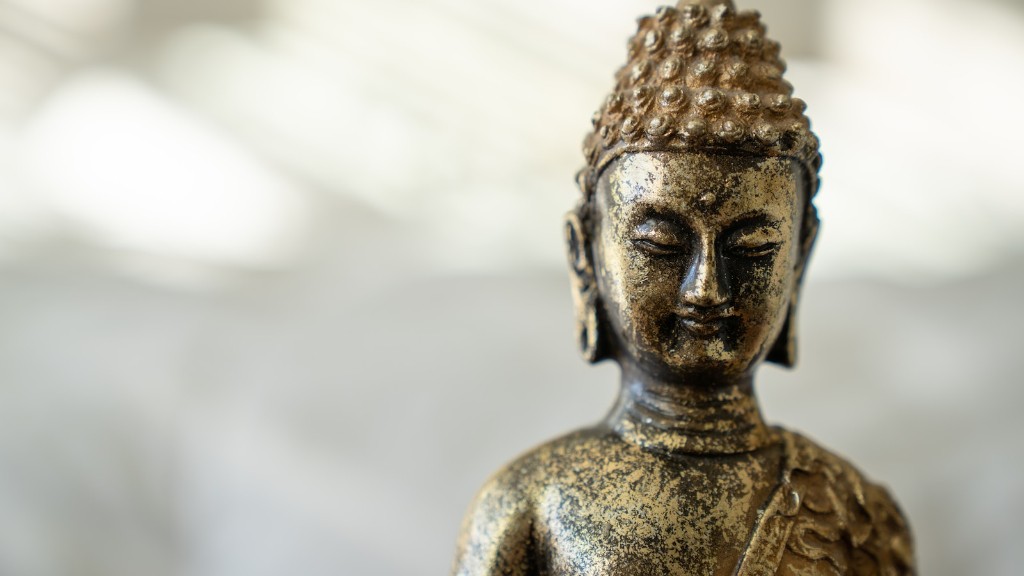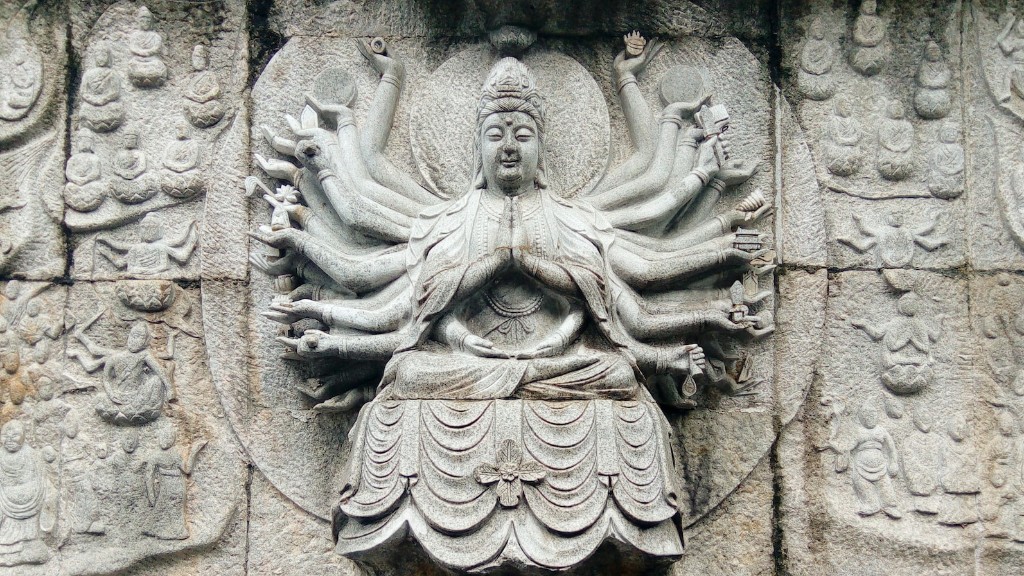Buddhism is a religion that is based on the teachings of Siddhartha Gautama, who is also known as the Buddha. The Buddha was born in Nepal in the 6th century BC, and he is the founder of Buddhism. The Buddha’s teachings are based on the Four Noble Truths, which are that suffering is an inherent part of life, that the cause of suffering is attachment, that suffering can be eliminated by letting go of attachment, and that the way to let go of attachment is through the Eightfold Path.
There is no one answer to this question, as the practice of Buddhism varies depending on the individual. Some people may choose to meditate regularly, while others may volunteering their time to help those in need. There are many different ways to practice Buddhism, and it is up to each individual to find what works best for them.
How is Buddhism practiced?
Buddhist monks follow a very strict daily routine that revolves around meditation, study of scriptures, and taking part in ceremonies. They live in Buddhist monasteries, or Gompas, and spend their days in prayer, contemplation, and self-reflection. Buddhist Stupas are also found all over the world, and are considered to be sacred places of worship.
There is no one “right” way to begin practicing Buddhism. All you need to do is start investigating the path, undertake the precepts, and take refuge. Many Mahayana schools and traditions have more formal procedures involving chanting, taking Bodhisattva vows, and the witnessing by a community. However, these are not required in order to begin practicing Buddhism.
What are the 3 main practices of Buddhism
The three main components of the Buddhist path are śīla, samadhi, and prajna. In order to progress on the path, it is necessary to develop each of these in turn.
Śīla, or moral conduct, is the foundation of the path. It is necessary to have a peaceful and harmonious mind if one is to develop concentration and wisdom.
Samadhi, or meditation, is the second step on the path. In order to develop wisdom, it is necessary to first develop concentration. This can be done through the practice of meditation.
Prajna, or wisdom, is the third and final step on the path. Once concentration and wisdom have been developed, one will be able to see the truth clearly.
The Five Precepts are guidelines for living a moral and ethical life. They are:
1. Refrain from taking life
2. Refrain from taking what is not given
3. Refrain from the misuse of the senses
4. Refrain from wrong speech
5. Refrain from intoxicants that cloud the mind.
These precepts help us to live a life that is in line with our values and beliefs. They remind us to treat others with respect and compassion, and to be mindful of our words and actions.
How to apply Buddhism in daily life?
Buddhism is a religion and philosophy that originated in India in the 6th century BCE. The Buddha, Siddhartha Gautama, taught that the way to end suffering is to end our attachment to the things that cause us suffering. To do this, we need to live in the present moment and be aware of our thoughts, emotions, and actions. We also need to be kind to others and practice compassion.
There are many ways to practice Buddhism in daily life. Here are some suggestions:
• Upon waking up, take a few moments to sit quietly and reflect on your day ahead. You can set an intention for the day, such as to be more patient or to act with kindness.
• Finding time to meditate each day can help you to focus on the present moment and be more aware of your thoughts and emotions.
• Practicing Dharma at the workplace can help you to be more mindful of your actions and interactions with others.
• Cultivating mindfulness can help you to be more aware of your thoughts and emotions, and to be more present in the moment.
• Being mindful of living in an interdependent world can help you to appreciate the interconnectedness of all beings and to act with
The monks go on alms round in the morning and the only other activities of the day are morning chores, breakfast, and the main meal. At 7:00 pm, the community gathers for pūjā, meditation, the taking of the precepts by the laity and a Dhamma talk.
Can anyone be a Buddhist?
Buddhism is a religion that is open to everyone. You do not have to be born into it or have Buddhist parents. You can be of any race, nationality, or social class. If you want to identify as a Buddhist, you can participate in a ceremony called taking refuge in the Triple Gem. This ceremony involves pledging to follow the teachings of the Buddha and to live your life in a way that is in line with his teachings.
Buddhism teaches that drinking alcohol can cause carelessness and should be avoided. Strong Buddhist beliefs would be expected to have a significant impact on alcohol use.
Do you have to pray as a Buddhist
Buddhists don’t pray in the sense of petitioning a higher power for favors or assistance, as many religions do. However, they do have devotional practices which could be compared to prayers.
One such practice is the recitation of mantras, which are sacred phrases or syllables that are repeated over and over as a form of meditation. Another is the practice of radiating loving-kindness to all living beings, which is believed to benefit those beings.
So while Buddhists don’t pray in the traditional sense, they do have practices which could be likened to prayer.
The virtues that we collect by giving to others are the perfections that may help us become a Buddha. Through our altruistic actions, we can develop the wisdom and compassion needed to reach enlightenment. May we all become Buddha’s and help create a more peaceful world.
How do Buddhists worship?
Buddhists worship at temples or monasteries as a way to meditate and pray. Some also set up shrines at home to have a place to worship privately. Buddhists usually offer fresh flowers, lights, and lamps, or burn fragrant incense at the shrines that have images of Buddha. They do these things to show respect to Buddha and to make merit for the devotee.
Buddhism is a tradition that is focused on spiritual liberation and does not believe in a creator god. The Buddha himself rejected the idea of a creator god and Buddhist philosophers have argued that belief in an eternal god is a distraction for humans seeking enlightenment.
What food is forbidden in Buddhism
Buddha’s advice for monks to avoid eating 10 kinds of meat is for self-respect and protection. The 10 kinds of meat are humans, elephants, horses, dogs, snakes, lions, tigers, boars and hyenas. By avoiding these kinds of meat, monks can protect themselves from harmful beings and also respect their own bodies.
The precepts are guidelines for living a moral and ethical life according to the Buddhist tradition. They are meant to help practitioners develop their character and make progress on the path to enlightenment. The precepts include commitments to abstain from killing living beings, stealing, sexual misconduct, lying and intoxication.
What is Buddhism for beginners?
Buddhism is a religion, a philosophy, or a set of beliefs and practices based on the teachings of the Buddha. The Buddha was an Indian spiritual seeker who attained enlightenment more than 2,600 years ago. Buddhism teaches that suffering is caused by attachment to things that are impermanent, and that the way to end suffering is to detach from those things. Buddhists seek to end suffering by following the Noble Eightfold Path, which includes ethical conduct, meditation, and wisdom.
In today’s world, it can be difficult to remain mindful and self-accountable for our own peace of mind. It is important to see the good in every living being, and to realize that we all make bad decisions as a result of suffering and misperception. We should strive to be kind, and to forgive ourselves and others.
Conclusion
There is no single answer to this question, as the practice of Buddhism can vary greatly depending on the individual and the tradition they follow. Generally speaking, however, Buddhist practices can include things such as meditation, mindfulness, ethical living, and study of the Buddha’s teachings.
There is no one answer to this question as Buddhism is a way of life that can be practiced in many different ways. Some people may choose to live a simple life in accordance with the Buddha’s teachings, while others may choose to monks or nuns and dedicate their lives to Buddhism. The important thing is that each person finds their own path to Enlightenment.


